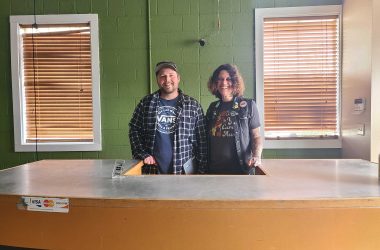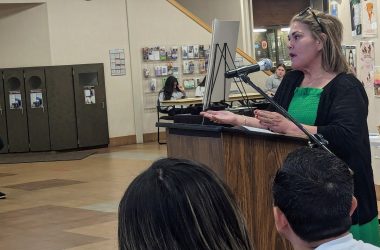Elderberry Wisdom Farm was awarded $10,000 from the National Endowment for the Arts to support training Native Americans to film short documentaries that could offer a window into their tribes’ way of life.
The Salem nonprofit that provides outreach, including through the cultural arts, will get funds from NEA’s Challenge America Program, meant to support small business and underrepresented groups. The announcement came via a news release from U.S. Sens.Jeff Merkley and Ron Wyden, who helped secure the funds.
“Oregon is home to incredible organizations that support artists and allow more people to enjoy their work,” Wyden stated in the release. “These investments are much deserved, and I’ll keep fighting to help the art industry unlock its full potential.”
Elderberry Wisdom Farm, founded three years ago by Rose High Bear, has recorded oral histories, but now hopes to expand into the film world with the NEA grant.
“We’re very excited to work with a group of Native American youth from the University of Oregon,” said High Bear, who is director of the farm..
The nonprofit is partnering with the U. on the project. The money will pay for the services of the film instructor, Katherine “K’iya” Wilson, and four Native filmmakers, plus filmmaking equipment and supplies. The training will last from spring until the end of 2023.
“We’re not interested in training them to get excited about going to Hollywood and getting rich. We want them to return to their own tribe and help to restore their own culture, history and vitality,” High Bear said.
She noted that the farm is supportive of Native Americans training the students. Enter Wilson, one of the farm’s board members, will take the reins as a mentor. She works with the University of Oregon’s film program and the university’s Many Nations Longhouse.
Wilson is eager to help these Native American students.
“By the time I got to college, I realized I have disabilities,” said Wilson, who admits she once failed English. “I ran into these 16-millimeter filmmakers, who put a camera into my hands and taught me how to express without words. It saved my life. So, for me, this (film training program) is really personal.”
Wilson has two students who appear interested in the program, but no one has officially been accepted. The university intends to put up advertisements about it on social media and in the Longhouse, but is waiting for the green light from NEA to do so.
It is also not established where filming will take place, but Wilson hopes permission can be granted to do it inside the longhouse, which has strict rules.
“We’re still working on some of the smaller details,” she said.
The film training is expected to start in March.
Wilson noted that, following the start of that education, Mitchell Block, professor of documentary and film studies, hopes to teach a documentary film camp this summer. But that session could also include more than just the four students paid for with NEA funds.
“I’m in the process of working through setting it up,” Block said. “If for some reason, the university can’t do it, I’ve offered to work with Katherine and her students without the structure of the School of Journalism and Communications. I’ll be an instructor or mentor to these young people. I’ve done this all over the world and Eugene.”
Block — whose film “No Lies” made it into the National Register of Films of the Library of Congress — hopes the camp results in a one- to two-minute film from the Native students.
“I’m hoping if I do my two-week workshop, each student will make every possible documentary,” he said. “Once they know how to tell a story about a place, a person, a prophet, or tell a story poetically, then they have a tool set to tell every documentary story.”
When the students come out of the program supported by NEA, instructors hope they will be armed not only with the knowledge of making films, but how to submit them for showing.
“All the way — soup to nuts,” Wilson said.
She envisions the Native American filmmakers as able to “transform … an idea in their heart” onto the big screen.
“That is so huge,” said Wilson, who got emotional when she made the comment.
On that note, the Marion Cultural Development Corp., of which High Bear is a board member, will support a Salem screening of the students’ films.
“We have always believed in sharing the beauty of our culture, so we believe that by sharing it, we’ll raise the awareness and understanding of Native culture,” High Bear said. “It increases appreciation and respect. It’s a reconciliation activity.”
CORRECTION: Rebecca Cammissa is a visiting instructor at the University of Oregon. The caption on a photo earlier mistakenly listed her as a university student. Salem Reporter apologizes for the error.
STORY TIP OR IDEA? Contact reporter Kevin Opsahl by email at [email protected].
SUBSCRIBE TO GET SALEM NEWS – We report on your community with care and depth, fairness and accuracy. Get local news that matters to you. Subscribe today to get our daily newsletters and more. Click I want to subscribe!

Kevin Opsahl is the education reporter for Salem Reporter. He was previously the education reporter for The Mail Tribune, based in Medford. He has reported for newspapers in Utah and Washington and freelanced. Kevin is a 2010 graduate of Central Washington University in Ellensburg, Washington, and is a native of Maryland.









